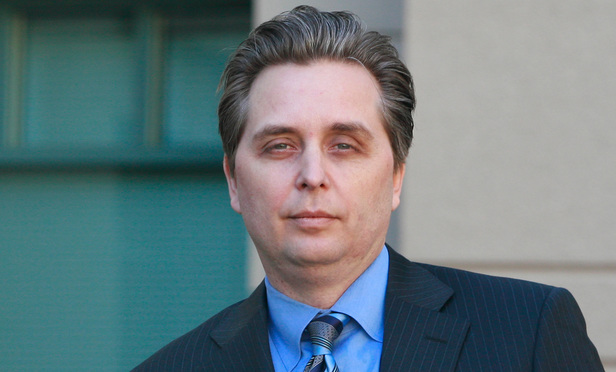 Yar Chaikovsky.
Yar Chaikovsky.
(Photo: Shelley Eades)
Monday was a big day for technology companies and the patent reform groups that support them. The Supreme Court’s 8-0 decision in TC Heartland v. Kraft Foods Group means many of them won’t have to defend patent litigation in the Eastern District of Texas.
Many of those cases will have to be filed in Delaware, where big tech companies tend to be incorporated, or the U.S. District Court for the Northern District of California, where many are headquartered. “As the original adopter of Patent Local Rules, the Northern District of California bench is very familiar with patent litigation and well-suited to absorb an increased number of patent lawsuits,” DLA Piper partner Andrew Valentine said in an email.
Beth Provenzano of United for Patent Reform used TC Heartland to make a pitch for further congressional changes to the patent system. “How many unanimous rulings will it take before Congress addresses at once and in total the broken elements of our patent litigation system?” she said in a written statement.
TC Heartland will shrink the 36 percent share of patent litigation currently owned by the Eastern District, and spare a lot of West Coast lawyers and executives the day-long trip to Marshall, Texas.
Fenwick & West IP chair Michael Sacksteder is among many attorneys expecting to spend less time in Texas. “For me personally, the impact is I will spend a lot less time in Marshall, Texas, and a lot more time in Delaware,” he said. “And I’ll have more cases in the Northern District of California.”
But the results may not be as sweeping as some hope.
The decision provides that venue for patent cases is in the defendant’s state of incorporation – or any place where infringement occurs and the defendant has “a regular and established place of business.” That was the rule before 1990, when the Federal Circuit issued its VE Holdings decision broadening patent venue – the decision overruled Monday by the Supreme Court.
Patent litigators agreed the meaning of that phrase is unsettled in the patent context because it’s lain dormant for 25 years. “We’re going to have a lot of fighting about what is a regular and established place of business,” said Paul Hastings partner Yar Chaikovsky.
Weil, Gotshal & Manges partner Edward Reines said it’s clear that a corporate headquarter qualifies, and probably any other location where a company has an established brick-and-mortar presence. He and Chaikovsky noted that a 1985 Federal Circuit decision said a fixed physical presence may not even be necessary.
“Whether a facility counts as a ‘regular and established place of business’ will be the subject of motion practice, but that inquiry will come out in the plaintiff’s favor in a substantial number of cases,” said Jeff Eichmann, who represents patent holders at Los Angeles’ Dovel & Luner, via email. The Eastern District “is not as barren as its critics often portray. It houses facilities for a number of repeat infringers.”
J.C. Penney is headquartered in the Eastern District, Hewlett Packard Enterprise, Intel Security, Intuit Inc., JPMorgan Chase & Co., Capital One Financial Corp., Cigna and Toyota Motor North America all employ 500 or more people in Plano, Texas, which is in the Eastern District.
Reines wondered if large companies with a minor presence in the Eastern District would be motivated to pull up stakes if they’re sued there regularly for patent infringement.
Some cases that won’t be eligible for the Eastern District may find homes elsewhere in Texas, Eichmann said. “Texas is a large state with many technology centers and facilities,” he said. “And there are several judges in other districts in the state that are experienced with patent cases and that also share the culture of the Eastern District judges in respecting the right to the jury trial.”
TC Heartland is still a net positive for technology companies, many of whom had urged the court as amici to return to the old patent venue rules. An exception was life sciences. Branded pharmaceutical companies often sue generics in their home state of New Jersey, but now will have to sue generics on their home turf. “It’s very likely that New Jersey’s going to lose litigation,” Chaikovsky said.
Another question left unanswered is whether TC Heartland will apply to limited liability companies or partnerships, which don’t have a state of incorporation. The Supreme Court expressly left that question open.
Silicon Valley IP attorney Neil Smith said he was glad to see VE Holdings get overruled, even though he advocated for the patent holder in the case before U.S. District Judge Samuel Conti of San Francisco a quarter-century ago. Back then the patent owner was simply trying to obtain venue in San Francisco – it wasn’t till years later that the decision led to widespread complaints about forum shopping in the Eastern District of Texas.




